20 Interesting Ferret Facts You Should know
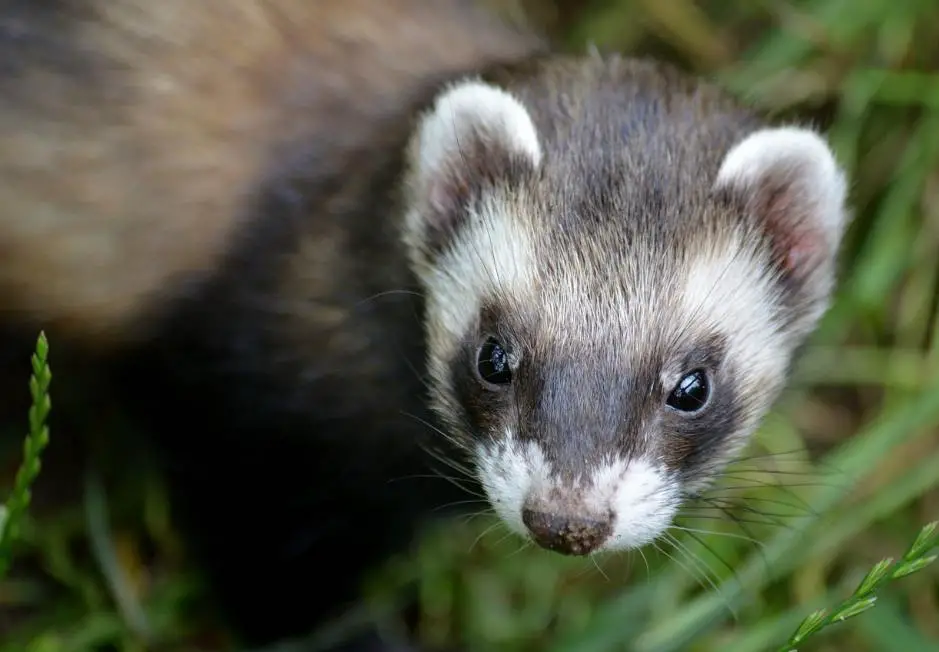
Are you ready to dive into the fascinating world of ferrets?
Buckle up because I’m about to blow your mind with some incredible ferret facts that will make you fall head over heels for these mischievous little furballs.
So grab a cup of tea, sit back, and get ready to be charmed by these adorable creatures like never before!
Interesting Ferret Facts
Here are some of the most interesting ferret facts you should know:
1. Ferrets are domesticated animals derived from the European polecat
Ferrets have a rich history of domestication, dating back thousands of years.
They are believed to have been first domesticated in Europe around 2,500 years ago.
The European polecat, a close relative of the ferret, served as the foundation for their domestication.
Over time, humans selectively bred ferrets for their desirable traits, such as their playful nature, curious personality, and ability to hunt rodents.
Through this process, ferrets became more docile and adapted to living alongside humans as beloved pets.
2. Baby ferrets are born without fur
When baby ferrets, also known as kits, are born, they are completely devoid of fur.
This unique characteristic sets them apart from many other mammals. In their early days, these tiny creatures are entirely dependent on their mother for warmth and nourishment.
As they grow, their fur starts to grow in, and they develop the luxurious coat that we often associate with ferrets.
It’s truly a remarkable transformation to witness as they go from being naked and vulnerable to sporting a luscious fur coat.
3. Ferrets are most active at dawn and dusk
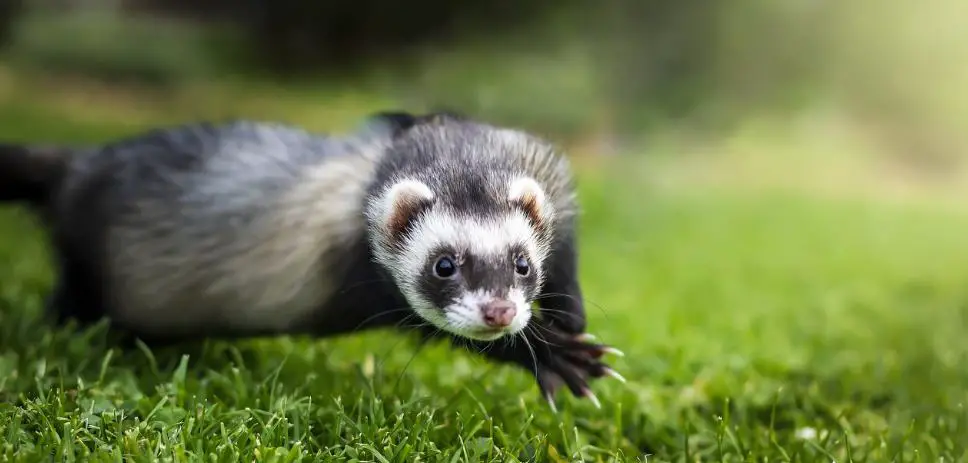
Ferrets are crepuscular animals, which means they are most active during the twilight hours of dawn and dusk.
This natural behavior is thought to be linked to their evolutionary traits as hunters.
During these periods, when the light is dimmer, their keen senses and sharp instincts come to life.
So, if you’re fortunate enough to share your life with a ferret, you might notice that they become more playful, energetic, and mischievous during these magical hours.
It’s like having your very own furry alarm clock in the morning or a lively companion for those tranquil evenings.
4. Ferrets have various names based on gender and age
Ferrets have their own unique naming conventions based on their gender and age.
When they are young and adorable, they are called kits. As they grow older, the males are referred to as hobs, while the females are called jills.
These names are endearing and add to the charm of these wonderful creatures.
When a male ferret becomes a father, he is called a sire, and a female ferret that becomes a mother is called a dam.
These names reflect the different roles and stages of life that ferrets go through, making them even more fascinating and special.
5. Ferrets do not sweat and are sensitive to heat
Unlike humans and many other animals, ferrets do not have sweat glands.
This means that when the temperature rises, they are unable to cool themselves down through the evaporation of sweat.
Instead, ferrets rely on other methods to regulate their body temperature. They will often seek out cool areas, such as tiled floors or shady spots, and may even stretch out flat on the ground to dissipate heat.
As responsible ferret owners, it’s important to be mindful of their sensitivity to heat and provide them with a cool and comfortable environment.
This can include ensuring they have access to fresh water, providing them with a well-ventilated living space, and avoiding exposing them to excessive heat or direct sunlight.
6. Ferrets can exhibit a dance called the weasel war dance
The weasel war dance, also known as the ferret dance, is a charming and playful behavior that ferrets often engage in when they’re feeling excited or playful. It’s an adorable sight to behold!
During the weasel war dance, ferrets bounce around, hop from side to side, and perform playful leaps and spins.
They might also emit joyful chirping or clucking sounds while engaging in this energetic dance.
Some experts believe that the dance is a way for ferrets to release pent-up energy and express their happiness.
So, the next time you see your ferret busting out some dance moves, grab a camera and capture the moment – it’s sure to bring a smile to your face!
7. Ferrets have a musky odor produced by scent glands
One of the distinctive traits of ferrets is their unique musky scent. Ferrets have scent glands located near their anus, which produce a natural odor.
This odor is their way of marking their territory and communicating with other ferrets.
While some people find the scent endearing, others may find it a bit strong or unpleasant.
However, with proper care and hygiene, you can manage and minimize the scent.
Regular bathing, using ferret-friendly shampoos, and cleaning their living area can help keep the odor under control.
It’s important to note that neutered or spayed ferrets tend to have a milder scent compared to those that are intact, as the hormones associated with reproduction can contribute to a stronger odor.
So, if you’re considering getting a ferret, be prepared for their unique scent and take steps to keep them fresh and clean.
8. Ferrets are notorious for their love of sleep
When it comes to snoozing, ferrets are true champions! These adorable creatures are known for their love of sleep.
On average, ferrets sleep for about 14 to 18 hours a day, which is quite impressive!
They are crepuscular animals, meaning they are most active during dawn and dusk, and tend to sleep for shorter periods throughout the day.
During their sleep, ferrets may enter deep sleep cycles, characterized by minimal movements and even twitching or dreaming.
It’s not uncommon to find a ferret curled up in their cozy bedding, completely lost in dreamland.
So, if you’re thinking of adopting a ferret, be prepared for their sleepy habits and make sure to provide them with a comfortable and safe place to rest.
Ferrets are known for their social nature. They enjoy the company of other ferrets and often form strong bonds with their furry companions.
Having a ferret friend not only provides them with a playmate but also helps fulfill their social needs.
They engage in playful wrestling matches, chase each other around, and even groom one another. It’s like having a built-in buddy system for your ferrets!
However, it’s important to note that not all ferrets get along instantly. Just like humans, they have their own unique personalities.
Introducing ferrets to each other requires careful supervision and gradual introductions to ensure they get along well.
With proper socialization and a bit of patience, you can create a harmonious ferret family.
10. Ferrets have a natural inclination to burrow and dig
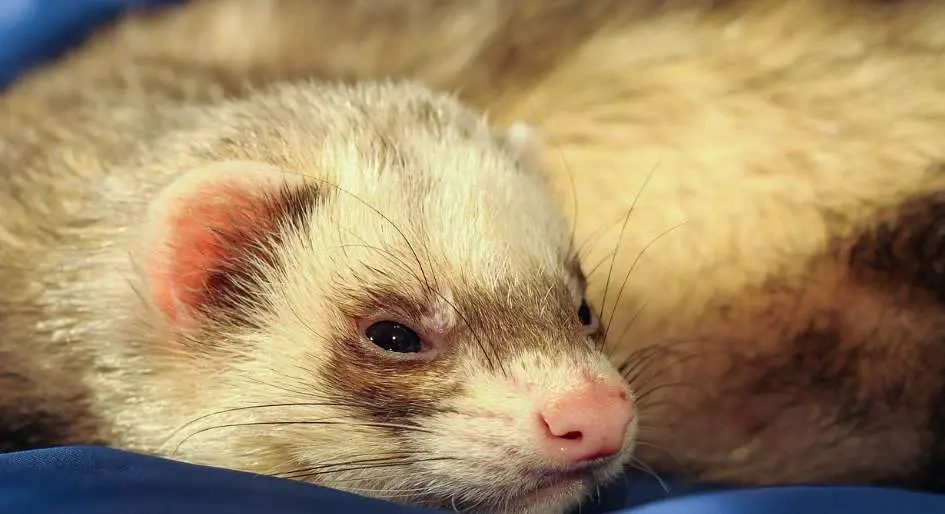
Ferrets are natural diggers. In the wild, they would dig burrows to create cozy nests or to hide from predators.
This instinct is still very much present in domesticated ferrets.
You might find your mischievous ferret burrowing into piles of laundry, tunneling under blankets, or even trying to dig through your carpet.
To satisfy their burrowing instincts, you can provide them with safe and appropriate outlets.
Consider setting up a designated dig box filled with safe materials like rice or shredded paper.
This will give your ferret an opportunity to indulge in their digging desires without causing any harm to your belongings.
11. Ferrets are obligate carnivores
Unlike some other animals, ferrets are obligate carnivores, which means they require a diet that consists solely of meat.
Their bodies are designed to efficiently digest and absorb nutrients from animal proteins.
Feeding them a balanced diet that includes high-quality, meat-based ferret food is crucial to their health and well-being.
The ideal ferret diet should consist of a combination of commercial ferret food and fresh meat.
Good options include raw or cooked meat like chicken, turkey, and lamb.
Avoid feeding them foods that are high in carbohydrates, as ferrets have a limited ability to process carbohydrates and can develop health issues if their diet is too high in sugars or grains.
12. Ferrets are curious creatures and love to explore their surroundings
Ferrets have an insatiable curiosity. They are always on the lookout for new things to explore and investigate.
You might find them squeezing into tight spaces, poking their noses into everything, or even stealing small objects to stash away in their secret hiding spots.
To keep your ferret engaged and mentally stimulated, provide them with plenty of opportunities to explore their environment.
Set up tunnels, hide toys for them to find, or create obstacle courses that challenge their agility and problem-solving skills.
Just be sure to ferret-proof your home to keep them safe and prevent any accidental escapes or access to hazardous items.
13. Ferrets are escape artists
Ferrets have a natural instinct to explore and investigate their surroundings.
They are incredibly agile and possess a slender, flexible body that allows them to squeeze through tight spaces.
Their bodies are built for maneuvering, with long backs, muscular limbs, and a lack of a collarbone, which enables them to contort and wiggle their way through narrow openings.
It’s not uncommon for ferrets to find creative ways to escape their enclosures, whether it’s by squeezing through a small gap in the fence or by figuring out how to open latches or doors.
Ferret owners often have to be extra cautious and take special precautions to ensure their furry friends stay safe and secure.
14. Ferrets have a highly developed sense of smell
The sense of smell in ferrets is truly remarkable. Their noses are incredibly sensitive, allowing them to detect scents that are imperceptible to humans.
Their olfactory system is so advanced that they can even detect prey underground, making them excellent hunters.
Ferrets use their sense of smell to explore their environment, identify familiar scents, and locate food or treats hidden away.
It’s not uncommon to see a ferret’s nose twitching and sniffing the air as they follow intriguing scents.
This heightened sense of smell is a crucial part of their survival and is one of the reasons they excel as hunting companions.
15. Ferrets can make a variety of sounds to express themselves
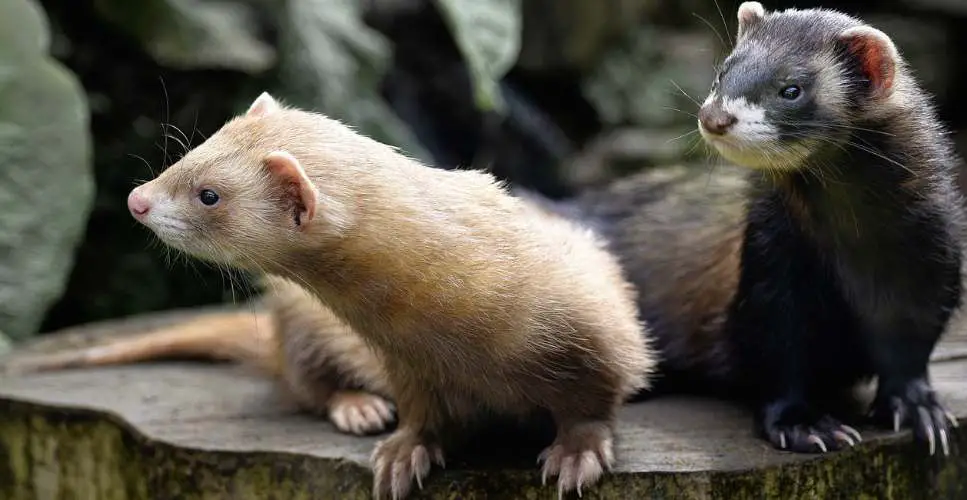
Ferrets are quite vocal creatures and have a range of sounds they use to communicate their thoughts and emotions.
One of the most distinctive sounds they make is the “dook,” which is a high-pitched, chirping noise that is often associated with excitement or happiness.
It’s a sound that can bring a smile to any ferret owner’s face. However, ferrets also have other vocalizations.
They can hiss when they feel threatened or annoyed, emit a low growl when they’re trying to protect their territory, and even make soft chuckling noises when they’re content.
Each sound is unique and can provide insight into a ferret’s state of mind. Understanding their vocal language can help build a stronger bond between ferrets and their human companions.
Learn more about ferrets as pets.
16. Ferrets are illegal in some places
While ferrets are beloved pets for many people around the world, it’s important to note that they are not legal in all areas.
Some countries, states, or municipalities have restrictions or outright bans on owning ferrets as pets.
These regulations are often in place due to concerns about the potential impact on local wildlife or the risk of them becoming invasive species.
It’s crucial for potential ferret owners to research and understand the laws and regulations in their specific area before considering getting a ferret as a pet.
It’s always better to be aware of and comply with local regulations to ensure the well-being of both the ferret and the surrounding environment.
17. Ferrets are part of the Mustelidae family
Ferrets belong to the Mustelidae family, which is a diverse group of carnivorous mammals known for their sleek bodies, sharp teeth, and playful nature.
This family includes various species like weasels, otters, badgers, and minks, among others.
Despite their small size, ferrets share many characteristics with their Mustelidae relatives.
They have long, flexible bodies that allow them to maneuver through tight spaces, making them natural explorers and escape artists.
Their playful and mischievous personalities make them a joy to have as pets or to observe in their natural habitats.
Learn more about the pros and cons of owning ferrets.
18. Baby ferrets are born deaf and blind
When baby ferrets, also known as kits, are born, they come into the world deaf and blind.
Their eyes and ears remain closed initially, leaving them reliant on their other senses, primarily touch and smell, to navigate their surroundings.
This reliance helps them develop a strong bond with their mother as they explore their environment through touch and scent.
As they grow, their eyes and ears gradually open, allowing them to experience the world in all its sights and sounds.
It’s a remarkable transformation to witness as these tiny creatures develop and begin to interact with their surroundings.
Learn more about caring for ferrets.
19. Ferrets reach sexual maturity at only 4–8 months of age
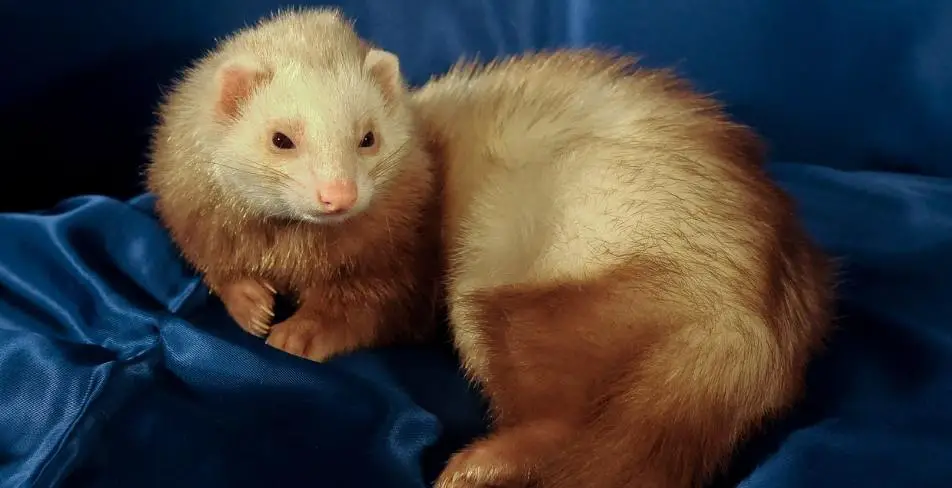
One of the most surprising facts about ferrets is their early sexual maturity.
Unlike many other animals that take longer to reach adulthood, ferrets become sexually mature at a remarkably young age.
At just 4 to 8 months old, these little bundles of energy are ready to start their journey into adulthood.
It’s important to note that ferrets can breed at this age, so responsible owners should ensure their pets are spayed or neutered to prevent unintended litters.
Despite their early maturity, ferrets maintain their playful and curious nature throughout their lives, bringing joy and entertainment to those around them.
20. The average lifespan of a ferret is 8–10 years
While ferrets bring immense joy and companionship, it’s important to be aware that they have a relatively short lifespan compared to many other pets.
On average, ferrets live for about 8 to 10 years. This lifespan can be influenced by various factors such as genetics, diet, exercise, and overall care.
Providing a nutritious diet, regular veterinary check-ups, and a stimulating environment can help ensure your ferret lives a happy and healthy life.
Despite their shorter lifespan, ferrets have the ability to form strong bonds with their human companions and fill their lives with love and laughter.
These unique ferret facts showcase the fascinating aspects of these adorable creatures.
Learn more about ferret behaviors.
Conclusion
In conclusion, ferrets are fascinating and delightful companions. From their playful antics to their curious nature, they never fail to bring joy to our lives. So, if you’re looking for a pet that’s both entertaining and affectionate, consider welcoming a ferret into your home.
